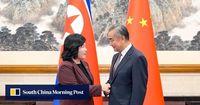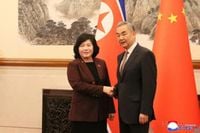Diplomatic activity in East Asia has picked up steam, with North Korea and China showcasing a renewed commitment to their historic alliance amid shifting global tides. On Sunday, September 28, 2025, North Korean Foreign Minister Choe Son-hui met with her Chinese counterpart Wang Yi at Beijing’s Diaoyutai State Guesthouse, marking her second visit to the Chinese capital in just one month. According to North Korean state media, the two diplomats exchanged views on international and regional matters, ultimately reaching what was described as a “complete consensus.”
This high-level meeting follows a flurry of recent contacts between the two nations. Earlier in September, North Korean leader Kim Jong-un traveled to Beijing for a massive military parade celebrating the 80th anniversary of China’s victory in World War II. There, Kim stood shoulder-to-shoulder with Chinese President Xi Jinping and Russian President Vladimir Putin—a tableau that spoke volumes about the evolving alliances in the region, as reported by Reuters and other outlets.
During Sunday’s talks, Choe Son-hui emphasized the significance of the recent parade, calling it a demonstration of China’s “historic achievements” and its stature in the international community, as noted by the Korean Central News Agency (KCNA). She also relayed Kim Jong-un’s message that the bilateral relationship should not only remain steadfast but adapt to meet “the demands of the times.”
Wang Yi, for his part, described Choe’s visit as the first by a senior North Korean delegation since the landmark summit between Kim and Xi on September 4, 2025—the first such meeting in over six years. According to KCNA, Wang stressed the need to use the shared understanding between Kim and Xi as a “fundamental guideline,” urging both sides to strengthen strategic communication, promote mutual visits and cooperation, and work together to safeguard regional peace and stability. Wang also signaled China’s willingness to pursue high-level exchanges in the near future.
China’s official Xinhua News Agency offered a slightly more measured account, describing the meeting as a “deep exchange of views on matters of mutual concern.” South Korean officials and regional experts noted this difference in tone, suggesting that while North Korea highlighted complete agreement, China preferred to underline ongoing dialogue and nuanced positions. “There appears to be a slight difference,” Koo Byoung-sam, spokesperson at South Korea’s Unification Ministry, told reporters, referencing North Korea’s emphasis on economic cooperation and China’s focus on broader strategic alignment.
Choe’s visit, which began at Wang’s invitation on Saturday and was scheduled to last until Tuesday, comes at a particularly sensitive moment. Preparations are underway in Pyongyang for a massive military parade on October 10 to mark the 80th anniversary of the founding of the Workers’ Party of Korea. Speculation is rife that a high-ranking Chinese official—or possibly even Xi Jinping himself—could attend, further cementing the ties between the two socialist neighbors.
The context for this diplomatic push is complex. Both countries face mounting pressure from the United States and its allies, and their deepening engagement comes as each seeks to shore up its position amid a changing world order. According to Reuters, China’s continued support provides North Korea with crucial diplomatic cover, especially regarding its controversial nuclear program. The relationship offers Beijing leverage in regional affairs, while giving Pyongyang economic and political lifelines that help blunt the impact of international sanctions.
The parade in Beijing earlier this month was particularly notable not just for its symbolism, but for the presence of Vladimir Putin alongside Kim and Xi. This visible show of solidarity hints at an emerging authoritarian bloc, with Russia, China, and North Korea coordinating more closely in opposition to U.S. alliance structures. Such trilateral partnerships enhance each nation’s leverage against Western pressure, but also heighten concerns about nuclear proliferation and regional security, as highlighted in analysis from BBC Monitoring and NK News.
During the meeting, Choe explicitly pledged to deepen cooperation with China in multilateral forums, to oppose “hegemonism” and “unilateralism”—widely interpreted as references to U.S. policies—and to advocate for a fairer world order. “Pyongyang is willing to work closely with Beijing in multilateral cooperation to jointly oppose unilateralism and power politics, and to establish a fairer and just world order,” Choe said, according to a Chinese foreign ministry statement cited by the South China Morning Post.
Wang Yi echoed these sentiments, reaffirming Beijing’s opposition to “all forms of hegemonism” and calling for expanded “strategic communications” and exchanges with Pyongyang, as reported by Xinhua. The two sides’ common stance against perceived U.S. interference and sanctions was clear, though the language used by each hinted at subtle differences in priorities and tactics.
Experts suggest that the talks likely covered North Korea’s policy toward Washington and the possible resumption of U.S.-North Korea dialogue. With the United States and South Korea having recently proposed a three-stage denuclearization plan, North Korea is expected to push instead for arms control talks under its self-declared status as a nuclear weapons state. Pyongyang is also likely to demand an end to joint U.S.-South Korea military drills and the withdrawal of American strategic assets from the region—moves that would also serve China’s security interests, according to Yang Moo-jin, an honorary professor at Seoul’s University of North Korean Studies.
The timing of the meeting is also significant in light of Xi Jinping’s expected visit to South Korea for the Asia-Pacific Economic Cooperation (APEC) summit from October 31 to November 1. As Seoul prepares to host both Xi and potentially former U.S. President Donald Trump, it faces a delicate balancing act: maintaining constructive relations with Beijing while managing the persistent threat posed by North Korea’s nuclear ambitions.
China’s open diplomatic support and continued economic ties with North Korea have long undermined the effectiveness of international sanctions, according to Reuters. The growing coordination among Russia, China, and North Korea not only complicates the diplomatic landscape for the U.S. and its allies, but also raises the stakes for regional security and global non-proliferation efforts.
Despite speculation of strains in the China-North Korea relationship—particularly over Pyongyang’s burgeoning military ties with Moscow—the recent meetings and public statements suggest that the alliance remains robust. Kim Jong-un’s high-profile appearance with Xi Jinping, the extended leaders’ meeting, and now Choe Son-hui’s back-to-back visits to Beijing all point to a renewed emphasis on cultivating ties, even as both countries navigate a rapidly changing world.
As North Korea prepares for its upcoming military parade and China looks ahead to a pivotal diplomatic engagement in South Korea, the world will be watching closely. The evolving partnership between Beijing and Pyongyang—tempered by history, necessity, and shared strategic interests—continues to shape the balance of power in East Asia and beyond.


